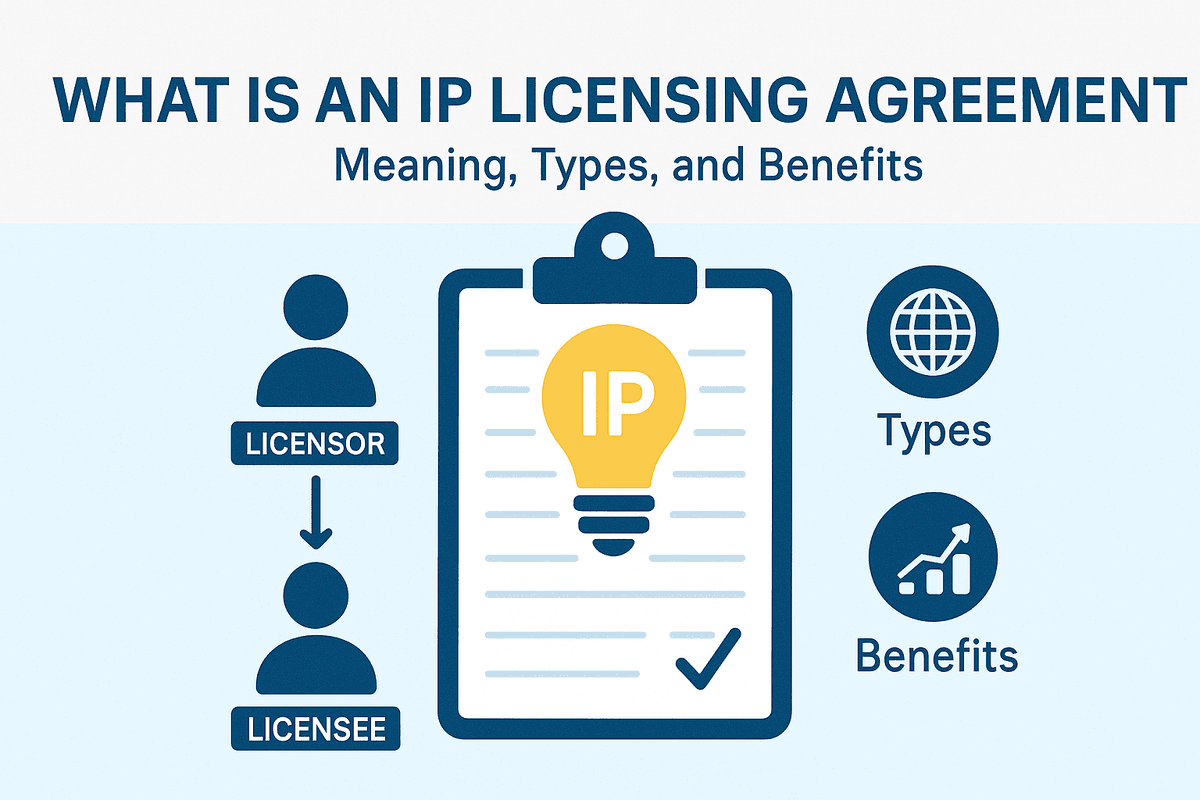What is an IP Licensing Agreement

In today’s knowledge-driven economy, intellectual property (IP) is often more valuable than physical assets. From software to trademarks, businesses rely on IP licensing agreements to monetize and protect their creations. But what is an IP licensing agreement in India, and how can it benefit startups, creators, and established companies? This full guide by Vakeel Saab explains the meaning, types, and advantages of intellectual property licensing agreements.
An IP licensing agreement is a legal contract where the owner of intellectual property (licensor) grants permission to another party (licensee) to use the IP under defined terms. These agreements can cover patents, trademarks, copyrights, trade secrets, and know-how. They are essential for businesses that want to expand, commercialize, or collaborate without selling ownership rights. This blog covers the types of IP licensing agreements, benefits, royalty structures, and why working with IP lawyers in India is crucial for protecting your rights.
What is an IP Licensing Agreement?
An intellectual property licensing agreement is a contract that defines how IP can be used by another party. It sets out the scope, duration, territory, royalties, and restrictions. Unlike IP assignment, licensing does not transfer ownership — it only grants usage rights.
IP Licensing vs Assignment
- IP Licensing: Licensor retains ownership, but licensee gets permission to use IP under agreed terms.
- IP Assignment: Ownership of the IP is permanently transferred to another party.
For startups and businesses, licensing often provides flexibility while preserving ownership.
Types of IP Licensing Agreements
Different kinds of intellectual property can be licensed through contracts. Common types of IP licensing agreements include:
- Trademark Licensing Agreement India: Allows use of a brand name, logo, or symbol under conditions.
- Patent Licensing Agreement India: Authorizes the use of patented inventions for manufacturing or distribution.
- Copyright Licensing Agreement India: Grants rights to reproduce, distribute, or adapt literary, musical, or artistic works.
- Know-How and Trade Secret Licensing: Permits access to confidential business knowledge, processes, or technology.
Exclusive vs Non-Exclusive IP Licenses
- Exclusive License: Only one licensee has rights to use the IP, excluding even the owner in that territory/field.
- Non-Exclusive License: Multiple licensees can use the IP simultaneously, with ownership still retained by the licensor.
Key Clauses in an IP Licensing Agreement
According to IP lawyers in Delhi, the following clauses are critical in an IP licensing agreement format India:
- Scope of licensed rights (territory, duration, industry)
- Royalty in IP licensing India (fixed, percentage-based, or hybrid)
- Confidentiality and data protection clauses
- Quality control standards (especially in trademark licensing)
- Termination clause and remedies for breach
- Dispute resolution (arbitration or courts)
Benefits of IP Licensing in India
Some of the major benefits of IP licensing in India include:
- Monetization of intellectual property through royalties
- Expansion into new markets without direct investment
- Collaboration opportunities for startups and established firms
- Risk sharing between licensor and licensee
- Retaining ownership while generating income
IP Licensing for Startups and Businesses
For startups, IP licensing agreements can provide revenue streams, brand collaborations, and market access. For businesses, licensing is a cost-effective way to scale without building everything in-house. With Vakeel Saab’s intellectual property lawyer consultation, companies can draft balanced agreements that protect IP value while enabling growth.
Frequently Asked Questions (FAQ)
What is an IP licensing agreement?
It is a legal contract where the owner of IP allows another party to use it under defined terms without transferring ownership.
What types of IP can be licensed?
Patents, trademarks, copyrights, trade secrets, and know-how can be licensed in India.
What is the difference between IP licensing and assignment?
Licensing retains ownership with the licensor, while assignment transfers ownership permanently to the assignee.
What is an exclusive license?
An exclusive license grants sole usage rights to one licensee, often restricting even the owner from using the IP in that field.
How are royalties calculated in IP licensing?
Royalties may be fixed, percentage-based on sales, or a hybrid, depending on the agreement and industry standards.
Looking to license your intellectual property or enter into a licensing deal? Don’t risk vague contracts or unfair terms. Vakeel Saab connects you with top IP lawyers in India and IP lawyers in Delhi for expert IP lawyer consultation. Book your consultation today and secure your intellectual property rights with confidence.
Related Articles
The Importance of Consulting a Property Lawyer for Real Estate Issues
Blog
How to File a POCSO Complaint in India: Step-by-Step Legal Process
Blog
What punishments does the law give for giving, taking, or asking for dowry?
Blog
Reasons for the Increasing Divorce Rates in India
Blog
What is a Special Leave Petition? Meaning, Features, Process & & Who Can File?
Blog
What Is the Difference Between Mutual Divorce and Contested Divorce?
Blog